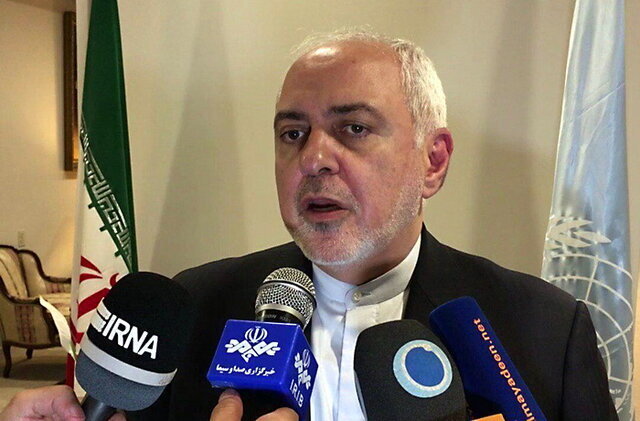Excessive sanctions threatening U.S. economy: Iran FM

TEHRAN – The Americans’ excessive use of sanctions against others will hurt the U.S. economy as well, Iranian Foreign Minister Mohammad Javad Zarif told reporters in Dhaka, Bangladesh, on Wednesday
The comments by Zarif came after the U.S. introduced a batch of sanctions on the Iranian space agency on Tuesday.
The U.S. imposed its first-ever sanctions against the Iran Space Agency, the Iran Space Research Center, and the Aeronautics Research Institute.
“The Americans have grown addicted to sanctions. These U.S. sanctions will produce no impact and the world will laugh at the U.S. gradually,” Zarif said, according to IRNA.
“They (the U.S.) have left no one but themselves to sanction as they have laid sanctions on everyone else and they make a move against one government or another each day.”
The minister added, “The U.S. use of economic leverage has come to grow so extreme that it will threaten the U.S. economy too gradually.”
Asked about the possibility of Washington’s return to the talks within the framework of the 2015 nuclear deal, Zarif said the U.S. can return to the talks only after it stops sanctions and violation of the nuclear deal.
Washington withdrew from the internationally-endorsed 2015 nuclear deal with Iran on May 2018, reimposed the toughest-ever sanctions against the country including a total ban on Tehran’s oil sales.
Under the nuclear agreement reached between Iran and 5+1 nations in July 2015, Tehran undertook to put limits on its nuclear program in exchange for the removal of nuclear-related sanctions.
Yet, Iran continued compliance with deal, stressing that the remaining signatories to the agreement (especially the Europeans) had to work to offset the negative impacts of the U.S. pullout from the agreement if they want Tehran to remain in compliance. The Iranian officials had earlier warned that the European Union’s failure in providing the needed ground for Tehran to enjoy the economic benefits of the nuclear deal would exhaust the country’s patience.
Almost a year later, however, the EU failed to provide Tehran with its promised merits. Then, the U.S. State Department announced that it had not extended two waivers, one that allowed Iran to store excess heavy water in Oman, and one that allowed Iran to swap enriched uranium for raw yellowcake with Russia.
Until then, Iran was allowed to ship low-enriched uranium produced at Natanz to Russia before it hit the 300-kg limit but the U.S. measure leaves no way for Tehran other than exceeding the ceiling for storing the enriched uranium in violation of the 2015 nuclear deal.
Also, the United States would no longer waive sanctions that allowed Iran to ship heavy water produced at the Arak facility beyond a 130-ton limit set in the 2015 nuclear deal to Oman for storage which again forces Tehran to store it inside the country in violation of the nuclear deal.
In return, Iran’s Supreme National Security Council (SNSC) announced in a statement on May 8 that the country had modified two of its undertakings under the JCPOA in retaliation for the U.S. abrogation of the deal and other signatories’ inability to make up for the losses under the agreement, warning that modifications would continue if the world powers failed to take action in line with their promises.
“The Islamic Republic of Iran declares that at the current stage, it does not anymore see itself committed to respecting the limitations on keeping enriched uranium and heavy water reserves,” the statement said.
Then Iran gave Europe 60 days to either normalize economic ties with Iran or accept the modification of Tehran’s obligations under the agreement and implement its proposed INSTEX to facilitate trade with Iran.
Iran set up a counterpart to INSTEX called Special Trade and Financing Instrument (STFI) to pave the way for bilateral trade.
SP/PA
